Fourth International Workshop on Skill Science
Associated with JSAI International Symposia on AI 2017 (IsAI-2017)
Call for Participants: SKL 2017
We organized Fourth International Workshop on Skill Science as below:
- Date:November 13, 2017
- Bunkyo School Building in University of Tukuba's Tokyo Campus (
 access)
access) - Lines: Yamanote line, Myogadani station
- The workshop is held as part of
 JSAI International Symposia on AI
JSAI International Symposia on AI
- The workshop is held as part of
- Fee:Please read the
 registration page of IsAI-2017
registration page of IsAI-2017 - It can also be viewed via the following link:
 Proceedings of SKL 2017 ( 45 pages, 2.7MB)
Proceedings of SKL 2017 ( 45 pages, 2.7MB) - Invited talk: Dr. Keisuke Fujii (Center for Advanced Intelligence Project, RIKEN)
- Human creative interaction of group sports: Information-based modeling
- Humans can creatively solve various problems through competition and cooperation among groups. However, with respect to the creative interaction such as sociality and body movement, we cannot even extract its feature from behavioral data yet. Here, we show information-based modeling in the creative interaction of group sport as an example of complex social interaction with an explicit and implicit context. First, we introduce the problems in intra-group cooperation and inter-group competition in the ballgame. In terms of information-based modeling, score prediction system and the cognitive process of cooperative players are explained. Next, we show two-player competition and its motor system modeling. Finally, we discuss future perspectives.
Aims and Scope
Human skills involve well-attuned perception and fine motor control, often accompanied by thoughtful planning. The involvement of body, environment, and tools mediating them makes the study of skills unique among researches of human intelligence. The symposium invites researchers who investigate human skills and provides them with a place for exchange and discussion. The study of skills requires various disciplines to collaborate with each other because the value of skills is not determined solely in terms of efficiency, but calls for consideration of quality. Quality resides in person and often needs to be transferred through apprentice systems. The procedure of validation is strict, but more complex than scientific activities, where everything needs to be described by referring to data. We are keen to discussing the theoretical foundations of skill science as well as practical and engineering issues in the study.
Topics
We aim to invite wide ranges of investigation into human skills, from science and engineering to sports, art, philosophy, anthropology, whatever concerns cultivating human possibilities. We welcome both theoretical and practical studies of human skills. We are keen to enabling for dialogue among researchers with different backgrounds given its interdisciplinary nature of the target. We welcome contributions from practicians as well as those from theorists. The experiences and insights through practices are valuable for increasing our knowledge of human skills. We hope that the workshop will enable people to raise questions stimulating our intellectual curiosity and to induce answers worth consideration.
- Topics of our interest include the followings:
- Data collection of skills
- Dynamics of human movements
- Synchronization of motions
- Training for Skill Acquisition
- Theory of Skill Acquisition
- Visualization of skills
- Assessment of skill acquisition
- Technologies for skill development
- Field research of skills
- Applications to performances
- Examination of experience
- Meta learning
- Methods for exploring the circumstances
- Care-giving to the elderly
- Conversation skills with people with cognitive difficulties
- Coordination of players in ensemble
- Skill development by athletes
- Sharing the experience
- Interview methods
- Self observation in career development
- Interactions between fighters
- Cultivating the perception
- Coaching in sports
- Modeling of sports performance
- Rhythmical movements
- Mathematical foundation of observation
- Logical approaches to skill discovery
- Body condition while concentration
- Cultivating athletic sense
- Skill transfer at production
- Training method for sign languages
- Meaning of gestures
- Conducting an orchestra
- Teaching piano
- Drummer's skill
- Qualitative analysis of dancing
- Organization of interactions
- Philosophical issues involved in skills
- Representation of skillful movements
- Interaction between body and intelligence
- Fishers' perception
- Narrative based approach to skill study
- Analysis of skillful communication
- Analysis of Craftsmanship
- Subtle behaviors in conversation
- Meta cognition in developing skills
- Virtual reality for skill acquisition
- Micro motor skills such as typing
- Assessing individual variations
- Rhetorical structures of performance
- Co-creation in skill development
- Attitudes to skill discovery
- Tools for meta cognition of actions
- Modes of motions
- Abstraction and transfer of skills
- Robotics related to skills
- Development of acts in theatre
- Coordination between workers at hospitals
- Analysis of care work to persons in physical needs
- Cooking skills
- Social impacts of skill science
- perception-cognition skills
- Skills of video game players
- Tools for skill development
Post Proceedings
Seleted articles will be published by Springer Verlag as part of Post Proceedings. Below point you to the tables of contents of the books for 2016 and 2015 workshops, respectively.
New Frontiers in Artificial Intelligence
http://www.springer.com/jp/book/9783319615714
http://www.springer.com/in/book/9783319509525
You can view the sites for previous years:
Time Table
09:45 - 09:50 Opening
09:50 - 10:20 Lecture_1. Prof. Tsutomu Fujinami
10:20 - 10:50 Coffee Break
10:50 - 11:35 Lecture_2. Dr. Jun Ichikawa
11:35 - 12:20 Lecture_3. Mr. Daichi Shimizu
12:20 - 13:10 Lunch
13:10 - 14:00 Interactive Session (6 presentations)
14:00 - 14:05 Break
14:05 - 14:50 Lecture_4. Mr. Takiguchi
14:50 - 15:20 Coffee Break
15:20 - 15:50 Lecture_5. Dr. Nishimura
15:50 - 16:00 Break
16:00 - 17:00 Invited Lecture. Dr. Keisuke Fujii
17:00 - 17:10 Closing
Program
09:50 - 10:20 Lecture_1. Prof. Tsutomu Fujinami
A Balance Study of Interaction between Martial Art Masters  pdf
pdf
*Tsutomu Fujinami (Japan Advanced Institute of Science and Technology)
10:50 - 11:35 Lecture_2. Prof. Jun Ichikawa [ pdf]
pdf]
Analyzing Individual Unique Body Movements in the Skill Acquisition Processes
*Jun Ichikawa (Kyoto Institute of Technology), Kazuhisa Miwa (Nagoya University), Hitoshi Terai (Kindai University)
11:35 - 12:20 Lecture_3. Prof. Daichi Shimizu
The Complicated Interaction between Expert Breakdancers: Distance as the Hidden Dimension [ pdf]
pdf]
*Daichi Shimizu, Takeshi Okada (Tokyo University)
13:10 - 14:00 Interactive Session (Six presentations)
Language Arts Education Method Using Programmable Humanoid Robots [ pdf]
pdf]
*Takashi Okuda (Aichi Prefectural University)
Development of the pole to present the information for improvement of the skill in Nordic walking [ pdf]
pdf]
*Yuta Ogai, Ryota Sugimoto, Yoshiya Mori, and Masahiko Yamamoto (Tokyo Polytechnic University)
Behavioral strategy of stepping-over: differences in obstacle’s height and individuals [ pdf]
pdf]
*Kentaro Kodama (Kanagawa University), Kazuhiro Yasuda (Waseda University),
Kohei Sonoda (Ritsumeikan University)
Characterizing task-specific motor variability in human skilled movements as dynamical invariants: a case study [ pdf]
pdf]
*Takuma Torii, Shohei Hidaka (Japan Advanced Institute of Science and Technology)
Analysis of the mental time using the coimagination method with expedition [ pdf]
pdf]
*Mihoko Otake, Er Sin Khoo
Motion study of breakdancers in mastering Thomas Flare [ pdf]
pdf]
*Naomichi Yashima, Tsutomu Fujinami (Japan Advanced Institute of Science and Technology)
14:05 - 14:50 Lecture_4. Prof. Itsuki Takiguchi
A study on intellectual tasks influenced by the embodied knowledge [ pdf]
pdf]
Itsuki Takiguchi (Chiba University)
15:20 - 15:50 Lecture_5. Dr. Takuichi Nishimura
Construction of Basic Skill Knowledge for Drawing Pictures [ pdf]
pdf]
Rieko Nishimura, Satoshi Nishimura, Takuichi Nishimura (RIKEN)
16:00 - 17:00 Invited Lecture. Dr. Keisuke Fujii [ pdf]
pdf]
Human creative interaction of group sports: Information-based modeling
Dr. Keisuke Fujii (Center for Advanced Intelligence Project, RIKEN)
Workshop Chair: Tsutomu Fujinami (Japan Advanced Institute of Science and Technology)
Steering Committee Members:
- Masaki Suwa (Keio University)
- Ken Hashizume (Osaka University)
- Mihoko Otake (RIKEN)
- Yoshifusa Matsuura (Yokohama National University)
- Kohichi Matsuda (Iwate Prefectural University)
- Yuta Ogai (Tokyo Polytechnic University)
- Kentaro Kodama (KANAGAWA UNIVERSITY)
Contact
skl-reg(at)jaist.ac.jp
replace @ for (at)
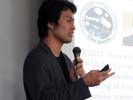
Keisuke Fujii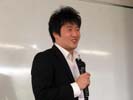
Daichi Shimizu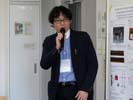
Yuta Ogai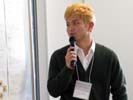
Naomichi Yashima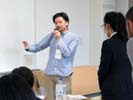
Kentaro Kodama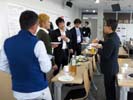
Interactive Session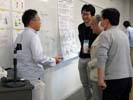
Interactive Session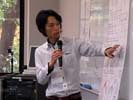
Takuma Torii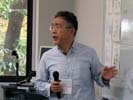
Takashi Okuda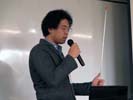
Itsuki Takiguchi

 HOME
HOME 前のページへ
前のページへ